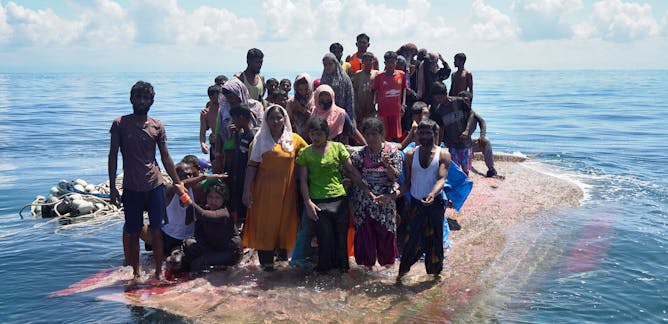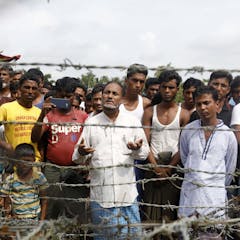
Articles on Rohingya
Displaying 1 - 20 of 97 articles

The number of Rohingya trying to escape Bangladesh by boat has risen 74% since October. Increasing lawlessness in the camps is one of the major push factors.

A human rights scholar explains how social media users can take charge of what content comes into their feed and reduce the risk of receiving misinformation.

Both countries have accepted very few Rohingya refugees to date, but new research suggests most Australians and New Zealanders are willing to resettle more.

Canada’s new Indo-Pacific strategy must include providing assistance to Rohingya women who have suffered sexual violence.

Myanmar’s democracy figurehead faces up to 100 years in prison.

The U.S. military collected biometric data on Afghan civilians. The information may have fallen into the hands of the Taliban, highlighting why collecting the data is too risky in the first place.

With hundreds now killed since the coup and civilians increasingly taking up arms against the junta, there are fears the country could be headed toward civil war.

International law bars nations from causing environmental harms in other states. Should that include sending thousands of refugees over the border in search of food, water and shelter?

South Africa frequently invokes its celebrated constitution that is based on human rights, but has often failed to live up to its ideals.

Plus why the situation for Rohingya Muslims living in Bangladesh has gone from bad to worse. Listen to episode 9 of The Conversation Weekly podcast.

Continued persecution in Myanmar and dire living condition in Bangladesh push Rohingya people to keep seeking refuge.

The roots of Buddhist nationalism in Myanmar go back to colonial days. Those behind the military coup are seeking to harness it to legitimize the seizure of power.

After arresting Aung San Suu Kyi once again, the army is clearly not ready to relinquish control.

Foreign companies are failing to heed the UN call to stop doing business with Myanmar’s blood-stained military elite.

Our project carried out interviews and produced animated films of brave people seeking to bring about real change.

The constitutional change needed to further democratise Myanmar is impossible without the military’s consent, so achieving major political transformation through the election alone seems unlikely.

Australia has maintained military and trade ties with Myanmar. If Myanmar is not fully complying with the ICJ order, this puts Canberra in a sticky position.

As more comes to light about the money-making tactics of social media platforms we need to reevaluate our relationship with them.

A scholar who spent time in refugee camps argues that Bangladesh’s culture as well as a painful history of a war in which 10 million sought refuge played a role in the country’s opening up of its borders.

Islamic solidarity, customary law and their experience of conflict and foreign aid can explain the Acehnese greeting people in need with open arms.
